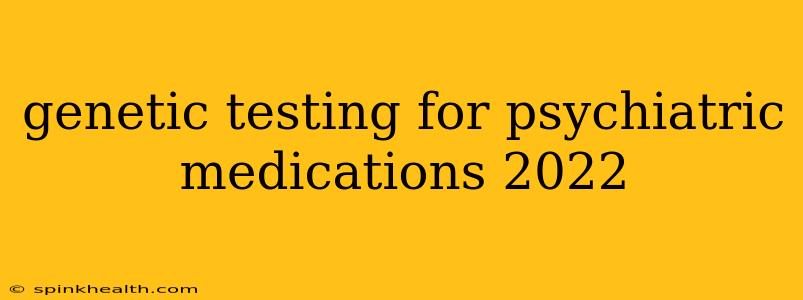The search for effective treatments for mental illnesses is a journey paved with both breakthroughs and challenges. For years, finding the right psychiatric medication has felt like a game of trial and error, a frustrating process of testing different drugs until one offers some relief. But a glimmer of hope has emerged: genetic testing. This technology promises to personalize medication choices, potentially accelerating the path to recovery and minimizing the side effects often associated with psychiatric drugs. Let's delve into the current state of genetic testing for psychiatric medications in 2022 and beyond.
What is pharmacogenomic testing for mental health?
Pharmacogenomics, the study of how genes affect a person's response to drugs, is revolutionizing the way we approach mental health treatment. Imagine a world where a simple genetic test could predict how your body will metabolize a specific antidepressant, allowing your doctor to prescribe the most effective and safest dosage from the start. That's the promise of pharmacogenomic testing for mental health. This testing analyzes your DNA to identify genetic variations that influence how your body processes medications, including those used to treat depression, anxiety, bipolar disorder, and schizophrenia.
How accurate is genetic testing for psychiatric medications?
The accuracy of genetic testing for psychiatric medications is a complex issue. While genetic factors undoubtedly play a role in drug response, they don't tell the whole story. Genetic tests can identify variations in genes that influence drug metabolism, but these are not the sole determinants of treatment success. Environmental factors, lifestyle choices, and individual patient characteristics also play significant roles. Think of it as a puzzle; genetics provides some pieces, but other factors are necessary to complete the picture. Therefore, while genetic testing is a valuable tool, it shouldn't be considered a definitive predictor of treatment outcome. It’s best used as one piece of information informing a broader treatment plan.
Does insurance cover genetic testing for mental health?
The coverage of genetic testing for mental health by insurance companies varies widely depending on your specific plan, location, and the type of test ordered. Some plans cover pharmacogenomic testing if deemed medically necessary by your physician, while others may not. It's crucial to contact your insurance provider directly to determine your coverage and understand any associated costs or pre-authorization requirements before proceeding with the test. The cost of the test itself can range considerably, adding another layer of complexity.
What are the benefits and limitations of genetic testing for psychiatric medications?
Benefits:
- Personalized treatment: Tailored medication choices based on individual genetic profiles can lead to faster symptom improvement and better overall outcomes.
- Reduced side effects: By predicting potential adverse reactions, genetic testing can help avoid prescribing medications likely to cause undesirable side effects.
- Improved treatment adherence: Knowing the likelihood of a drug's effectiveness might increase patient motivation to stick to their treatment plan.
Limitations:
- Not a perfect predictor: While helpful, genetic testing isn't foolproof. Other factors influence treatment response.
- Cost and accessibility: Testing can be expensive and not readily available to everyone.
- Interpretation challenges: Interpreting the results requires expertise, and clear communication between the doctor and patient is vital.
What are the different types of genetic tests available?
Several genetic tests are available, each focusing on different genes and offering varying levels of information. Some tests may focus on a specific gene related to a particular medication, while others may provide a broader analysis of multiple genes relevant to multiple medications. The type of test recommended depends on individual circumstances and the doctor's assessment.
Will genetic testing replace trial and error in psychiatric medication?
No, genetic testing is unlikely to completely replace the trial-and-error approach in psychiatric medication. It's a valuable addition to the process, providing valuable information, but it is not a silver bullet. It is one piece of information that should be considered alongside other factors to inform treatment decisions. It's a powerful tool, improving the efficiency and personalization of care, but not entirely eliminating the need for careful observation and adjustment of medication regimens.
The future of mental health treatment is likely to be deeply intertwined with pharmacogenomics. While 2022 marks a significant step forward, ongoing research and refinement of these tests are essential for maximizing their benefits and addressing their limitations. The journey towards personalized psychiatric care is ongoing, but the potential to significantly improve lives is undeniable.

